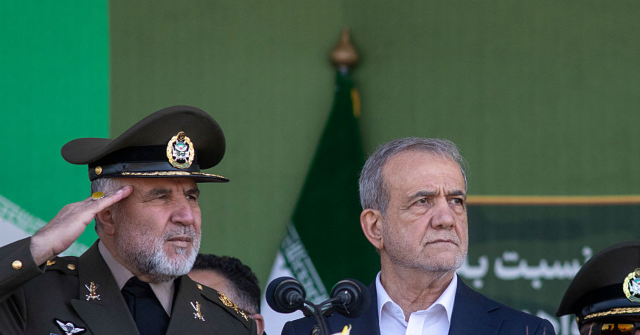President Masoud Pezeshkian of Iran, who is subordinate to elderly “supreme leader” Ayatollah Ali Khamenei, signed a parliamentary bill into law on Wednesday ending all cooperation with the International Atomic Energy Agency (IAEA).
The IAEA is an entity of the United Nations tasked with ensuring that member nations comply with international law on nuclear energy, particularly the Non-Proliferation Treaty (NPT). Iran is a party to the NPT and threatened to withdraw from the commitment in June as a response to attacks by Israel and America following warnings from the IAEA that Iran was not complying with its obligations.
The Iranian parliament, which acts only to implement the wishes of the “supreme leader,” passed a bill last week that would outlaw Tehran’s cooperation with the IAEA, a response to the agency revealing the country had violated its commitments. The bill required Pezeshkian’s signature, however, to become law, which arrived on Wednesday.
According to the Iranian propaganda outlet PressTV, the bill in question makes it illegal under Iranian law for IAEA nuclear inspectors to enter Iran and help inspect the functionality of its nuclear facilities.
“IAEA inspectors will not be permitted to enter Iran unless the security of the country’s nuclear facilities and that of peaceful nuclear activities is guaranteed, which is subject to the approval of Iran’s Supreme National Security Council,” according to PressTV.
The outlet added that the parliament was considering a separate bill personally banning IAEA Director-General Rafael Grossi from entering Iran.
Grossi — from Argentina, a nation that has endured multiple large-scale Iranian terrorist attacks in the past half-century — has complained of Iran’s non-cooperation with his agency for much of the past two years. In September, Grossi condemned Iran’s relationship with the IAEA as “completely unsatisfactory” and revealed that the country had been violating the provisions of the Joint Comprehensive Plan of Action (JCPOA), the Obama-era nuclear agreement, for at least three and a half years.
“You will note Iran’s stockpile of uranium enriched up to 20% and up to 60% continues to increase, and that Iran has expanded the number of cascades it is using to enrich UF6 [Uranium hexafluoride],” Grossi explained at the time. “It has been more than three and a half years since Iran stopped implementing its nuclear-related commitments under the JCPOA, including provisionally applying its Additional Protocol and therefore it is also over three and a half years since the Agency was able to conduct complementary access in Iran.”
That condemnation followed dismissive comments in June of that year in which Grossi said that the JCPOA “exists only on paper and means nothing.”
“Nobody applies it, nobody follows it,” Grossi lamented. President Donald Trump withdrew from the agreement in 2018 on the grounds that Iran consistently violated it, but the JCPOA continues to exist in theory as a pact between Iran and its other signatories: the United Kingdom, France, Germany, Russia, and China.
In June, after repeatedly warning that Iran appeared to be dramatically expanding its uranium enrichment efforts, Grossi told the IAEA board that he had evidence the country was maintaining secret nuclear sites and tried to “sanitize” them to hide them from the United Nations. On June 12, the IAEA passed a resolution condemning Iran for violating its NPT obligations. Iran responded by announcing the construction of yet another uranium enrichment site.
Hours later, the government of Israel launched “Operation Rising Lion” targeting some of Iran’s most powerful military leaders and expert nuclear scientists. President Trump joined the conflict on June 21, approving airstrikes to destroy the uranium enrichment facilities at Fordow, Isfahan, and Natanz.
While President Trump announced that the sites had been “totally obliterated,” the IAEA has not been able to confirm the extent of the damage as the Islamist regime has banned its inspectors from helping. Grossi has indicated that, based on satellite images of the sites post-airstrikes, substantial damage occurred, but he has emphasized that without being allowed to assess the sites on the ground, full knowledge of the damage is impossible.
“It is clear that there is one Iran before June 13 — nuclear Iran, and one now, and it’s night and day,” Grossi said in an interview with Fox News on June 24, concluding that the “nuclear program has been set back significantly.”
Grossi has nonetheless predicted that it would only take Iran “months” to restore at least some enrichment capacity.
“The capacities they have are there. They can have, you know, in a matter of months, I would say, a few cascades of centrifuges spinning and producing enriched uranium, or less than that,” he told CBS News on Sunday.
Following the strikes, Iranian officials have repeatedly asserted that they would continue nuclear development “under any circumstances” and begun a campaign to demand “reparations” from the United States and Israel. Iranian Foreign Minister Abbas Araghchi sent a letter to the leaders of the U.N. Security Council on Sunday demanding that the agency “recognize the Israeli regime and the United States as the initiators of the act of aggression and their subsequent responsibility, therefore including compensation and reparation.”
Araghchi first raised the issue of “compensation for damages” in an interview last week, specifying that Iran is seeking that compensation to reconstruct the nuclear sites that Trump sought to destroy as a result of Iran failing to agree to a new nuclear deal curbing uranium enrichment.
Follow Frances Martel on Facebook and Twitter.
Read the full article here


